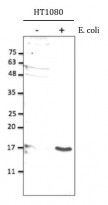ARG42531
anti-IL10 antibody
anti-IL10 antibody for IHC-Formalin-fixed paraffin-embedded sections,IHC-Frozen sections,Western blot and Dog,Human,Monkey,Mouse,Rat
Overview
| Product Description | Goat Polyclonal antibody recognizes IL10 |
|---|---|
| Tested Reactivity | Hu, Ms, Rat, Dog, Mk |
| Tested Application | IHC-Fr, IHC-P, WB |
| Host | Goat |
| Clonality | Polyclonal |
| Isotype | IgG |
| Target Name | IL10 |
| Antigen Species | Human |
| Immunogen | Purified recombinant Human IL10. |
| Conjugation | Un-conjugated |
| Alternate Names | IL10A; GVHDS; TGIF; IL-10; Cytokine synthesis inhibitory factor; CSIF; Interleukin-10 |
Application Instructions
| Application Suggestion |
|
||||||||
|---|---|---|---|---|---|---|---|---|---|
| Application Note | * The dilutions indicate recommended starting dilutions and the optimal dilutions or concentrations should be determined by the scientist. | ||||||||
| Positive Control | HT1080 + inactivated E. coli | ||||||||
| Observed Size | ~ 17 kDa |
Properties
| Form | Liquid |
|---|---|
| Purification | Affinity purification with immunogen. |
| Buffer | PBS, 0.05% Sodium azide and 20% Glycerol. |
| Preservative | 0.05% Sodium azide |
| Stabilizer | 20% Glycerol |
| Concentration | 3 mg/ml |
| Storage Instruction | For continuous use, store undiluted antibody at 2-8°C for up to a week. For long-term storage, aliquot and store at -20°C. Storage in frost free freezers is not recommended. Avoid repeated freeze/thaw cycles. Suggest spin the vial prior to opening. The antibody solution should be gently mixed before use. |
| Note | For laboratory research only, not for drug, diagnostic or other use. |
Bioinformation
| Database Links | |
|---|---|
| Gene Symbol | IL10 |
| Gene Full Name | interleukin 10 |
| Background | The protein encoded by this gene is a cytokine produced primarily by monocytes and to a lesser extent by lymphocytes. This cytokine has pleiotropic effects in immunoregulation and inflammation. It down-regulates the expression of Th1 cytokines, MHC class II Ags, and costimulatory molecules on macrophages. It also enhances B cell survival, proliferation, and antibody production. This cytokine can block NF-kappa B activity, and is involved in the regulation of the JAK-STAT signaling pathway. Knockout studies in mice suggested the function of this cytokine as an essential immunoregulator in the intestinal tract. Mutations in this gene are associated with an increased susceptibility to HIV-1 infection and rheumatoid arthritis. [provided by RefSeq, May 2011] |
| Function | Major immune regulatory cytokine that acts on many cells of the immune system where it has profound anti-inflammatory functions, limiting excessive tissue disruption caused by inflammation. Mechanistically, IL10 binds to its heterotetrameric receptor comprising IL10RA and IL10RB leading to JAK1 and STAT2-mediated phosphorylation of STAT3 (PubMed:16982608). In turn, STAT3 translocates to the nucleus where it drives expression of anti-inflammatory mediators (PubMed:18025162). Targets antigen-presenting cells (APCs) such as macrophages and monocytes and inhibits their release of pro-inflammatory cytokines including granulocyte-macrophage colony-stimulating factor /GM-CSF, granulocyte colony-stimulating factor/G-CSF, IL-1 alpha, IL-1 beta, IL-6, IL-8 and TNF-alpha (PubMed:1940799, PubMed:7512027, PubMed:11564774). Interferes also with antigen presentation by reducing the expression of MHC-class II and co-stimulatory molecules, thereby inhibiting their ability to induce T cell activation (PubMed:8144879). In addition, controls the inflammatory response of macrophages by reprogramming essential metabolic pathways including mTOR signaling (By similarity). [UniProt] |
| Cellular Localization | Secreted. [UniProt] |
| Calculated MW | 21 kDa |
Images (2) Click the Picture to Zoom In
-
ARG42531 anti-IL10 antibody WB image
Western blot: HT1080 cells unstimulated or stimulated with inactivated E. coli. 50 µg of cell lysates were stained with ARG42531 anti-IL10 antibody at 1:2500 dilution.
-
ARG42531 anti-IL10 antibody IHC-P image
Immunohistochemistry: Mouse testis stained with ARG42531 anti-IL10 antibody at 1:750 dilution.






